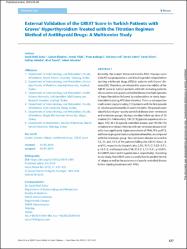External Validation of the GREAT Score in Turkish Patients with Graves' Hyperthyroidism Treated with the Titration Regimen Method of Antithyroid Drugs: A Multicenter Study

View/
Date
2019Author
Zuhur, Sayid ShafiElbuken, Gülşah
Yıldız, İsmail
Kadıoğlu, Pınar
Erol, Selvinaz
Şahin, Serdar
Altuntaş, Yüksel
Akbaba, Gülhan
Metadata
Show full item recordAbstract
Recently, the Graves & apos; Recurrent Events After Therapy score (GREAT) was proposed as a useful tool to predict relapse before starting antithyroid drugs (ATD) in patients with Graves & apos; disease (GD). Therefore, we intended to assess the validity of the GREAT score in Turkish patients with GD, including patients who experienced a poorly controlled disease (multiple episodes of hyperthyroidism followed by euthyroidism or rarely hypothyroidism) during ATD dose titration. This is a retrospective multicenter study including 517 patients with the first episode of GD who were treated for at least 12 months. The patients were classified as relapse+poorly controlled disease (non-remission) and remission groups. During a median follow-up time of 35 months (12-144 months), 191 (37%) patients experienced a relapse, 136 (26.3%) a poorly controlled disease, and 190 (36.7%) remained in remission. Patients with non-remission disease tended to have significantly higher serum levels of TRAb, fT4, and fT3, and have larger goiter sizes on palpation at baseline, as compared with the remission group. Non-remission disease occurred in 12, 35, and, 53% of the patients falling into GREAT class I, II, and III, respectively (hazard ratio 2.56, 95% CI 2.02-3.51, p=0.012, and hazard ratio 3.54, 95% CI 2.12-5.91, p<0.001, for GREAT class II and III against class I, respectively). According to our study, the GREAT score is a useful tool to predict the risk of relapse as well as the occurrence of poorly controlled disease before starting treatment with ATDs.

















